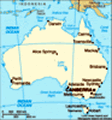Advertisement
Published: April 30th 2012
I want to share this poem with you. It's not mine, it's by Pablo Neruda. The translation is not mine either. I just like it and I want to introduce it to all of you. I would recomend to you to read it in Spanish if you have the option, I like it better! Enjoy the reading!
"Die Slowly" by Pablo Neruda
He who does not travel, who does not read, who does not listen to music, who does not find grace in himself, dies slowly. He who slowly destroys his own self-esteem, who does not allow himself to be helped, who spends days on end complaining about his own bad luck, about the rain that never stops, dies slowly. He who becomes the slave of habit, who follows the same routes every day, who never changes pace, who does not risk and change the colour of his clothes, who does not speak and does not experience, dies slowly. He or she who shuns passion, who prefers black on white, dotting ones rather than a bundle of emotions,
the kind that make your eyes glimmer, that turn a yawn into a smile, that make the heart pound in the face of mistakes and feelings, dies slowly. He or she who does not turn things topsy-turvy, who is unhappy at work, who does not risk certainty for uncertainty, to thus follow a dream, those who do not forego sound advice at least once in their lives, die slowly. He or she who abandon a project before starting it, who fail to ask questions on subjects he doesn’t know, he or she who don’t reply when they are asked something they do know, die slowly. Let’s try and avoid death in small doses, always reminding oneself that being alive requires an effort by far greater than the simple fact of breathing. Only a burning patience will lead to the attainment of a splendid happiness. About Pablo Neruda:
Pablo Neruda (1904-1973), whose real name is Neftalí Ricardo Reyes Basoalto, was born on 12 July, 1904, in the town of Parral in Chile. His father was a railway employee and his mother, who died shortly after his birth, a teacher. At the early age of thirteen he began to contribute some articles to the daily "La Mañana", among them,
Entusiasmo y Perseverancia - his first publication - and his first poem.
Between 1927 and 1935, the government put him in charge of a number of honorary consulships, which took him to Burma, Ceylon, Java, Singapore, Buenos Aires, Barcelona, and Madrid.
The Spanish Civil War and the murder of García Lorca, whom Neruda knew, affected him strongly and made him join the Republican movement, first in Spain, and later in France, where he started working on his collection of poems
España en el Corazón (1937). The same year he returned to his native country, to which he had been recalled, and his poetry during the following period was characterised by an orientation towards political and social matters.
España en el Corazón had a great impact by virtue of its being printed in the middle of the front during the civil war.
In 1939, Neruda was appointed consul for the Spanish emigration, residing in Paris, and, shortly afterwards, Consul General in Mexico, where he rewrote his
Canto General de Chile, transforming it into an epic poem about the whole South American continent, its nature, its people and its historical destiny.
In 1943, Neruda returned to Chile, and in 1945 he was elected senator of the Republic, also joining the Communist Party of Chile. Due to his protests against President González Videla's repressive policy against striking miners in 1947, he had to live underground in his own country for two years until he managed to leave in 1949. After living in different European countries he returned home in 1952. A great deal of what he published during that period bears the stamp of his political activities; one example is
Las Uvas y el Viento (1954), which can be regarded as the diary of Neruda's exile. In
Odas elementales (1954- 1959) his message is expanded into a more extensive description of the world, where the objects of the hymns - things, events and relations - are duly presented in alphabetic form.
Neruda's production is exceptionally extensive. For example, his
Obras Completas, constantly republished, comprised 459 pages in 1951; in 1962 the number of pages was 1,925, and in 1968 it amounted to 3,237, in two volumes. Among his works of the last few years can be mentioned
Cien sonetos de amor (1959), which includes poems dedicated to his wife Matilde Urrutia,
Memorial de Isla Negra, a poetic work of an autobiographic character in five volumes, published on the occasion of his sixtieth birthday,
Arte de pajáros (1966),
La Barcarola (1967), the play
Fulgor y muerte de Joaquín Murieta (1967),
Las manos del día (1968),
Fin del mundo (1969),
Las piedras del cielo (1970), and
La espada encendida.
He won the Nobel Prize in Literature in 1971.
http://www.nobelprize.org/nobel_prizes/literature/laureates/1971/neruda-bio.html
Advertisement
Tot: 0.172s; Tpl: 0.011s; cc: 10; qc: 51; dbt: 0.085s; 1; m:domysql w:travelblog (10.17.0.13); sld: 1;
; mem: 1.1mb









Robby
non-member comment
Neruda
I almost feel I have a connection, albeit slim to Pablo Neruda. when visiting Valpraiso, Chile in 2007 we visited his residence. whilst this may not be his poem, he certainly did make a mark on literature.